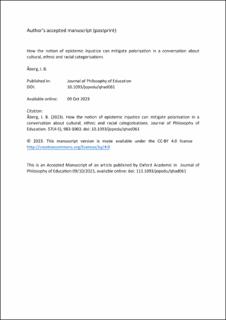How the notion of epistemic injustice can mitigate polarisation in a conversation about cultural, ethnic and racial categorisations
Peer reviewed, Journal article
Accepted version

Åpne
Permanent lenke
https://hdl.handle.net/11250/3123769Utgivelsesdato
2023Metadata
Vis full innførselSamlinger
Originalversjon
Åberg, I. B. (2023). How the notion of epistemic injustice can mitigate polarisation in a conversation about cultural, ethnic and racial categorisations. Journal of Philosophy of Education. 57(4-5), 983-1003. doi: 10.1093/jopedu/qhad061Sammendrag
It is a common contention that education done uncritically and unreflectively may serve to sustain and justify the status quo, in terms of mechanisms of cultural or racial privileging and marginalization. This article explores an argument made from within anti-oppressive education theory and advocated by theorist Kevin Kumashiro, namely that transformative education must entail altering harmful citational practices. I see two shortcomings in relation to this argument: first, its focus on discursive practice entails a prerequisite of high discursive literacy. Second, it may lead to a failure to give credit to people’s intentions, risking a conflation of honest mistakes and wilful ignorance, and depriving us of theoretical nuance. While a well-argued and important call, I argue in this article that both shortcomings lead to the risk of a polarized conversation. Focusing on cultural, ethnic, and racial categorization, and using social studies as an illustration, it is suggested that applying notions from the theoretical concept of epistemic injustice may open up a space for granting nuanced credit to people’s intentions, thereby mitigating the risk of polarization. Rather than viewing attention to outcome and attention to intention as oppositional to one another, it is argued that both theoretical perspectives may benefit from the insights of the other. By applying needed context-specificity and nuance to categorizations of dominance and marginalization in individual discursive exchange, this can be done without granting priority to the experience of dominantly situated knowers.
